SGBV

The Nakuru Sexual and Gender Based Violence (SGBV) Network was established from the Nakuru Protection Working Group(PWG) to improve and support the prevention of and response to SGBV in Nakuru County. We also launched a programme in Nakuru, to help victims overcome trauma associated with the vices o Sexual and Gender Based Violence.
The SGBV groups has worked together with Gaplink International organization (GLI) towards mitigating and effective response in scaling down the level of SGBV through activities like:
Awareness creation, community sensitization and education work, advocacy and sensitization on women and girl (‘since they are the most affected by SGBV) empowerment while campaigning to change unequal power relations between men and women with an aim to end SGBV. To also: raise awareness and mobilize on SGBV and rights this creates a critical mass of the Nakuru county people (females and males) who believe in gender equality and are able to influence communities to also end SGBV and reduce prevalence of Rape, defilement, domestic violence “fighting” and killing . 2. Capacity building. 3. Fostering of more strong partnerships and networking.


The Gender Desk at Kaptembwo Police Station in Nakuru has a new office structure for this crucial unit will improve service delivery and facilitate survivors’ access to justice. The newly launched unit, which is the second of its kind in Nakuru County, with one already, located at the Nakuru Central Police Station, will be manned by police officers trained on gender and child protection to carry out the following roles:
- Protecting the dignity of survivors of sexual and gender-based violence by ensuring confidentiality, respect and safety during reporting of cases.
- Facilitating professional documentation and investigation of Sexual and Gender Based Violence cases, collection and preservation of evidence to support access to justice while ensuring protection/survivor safety.
- Facilitating a SGBV reporting process so that complainants may report to the police without fear and ensuring that complaints are processed expediently and efficiently.
- Provide survivors with referrals to the health, psychosocial and legal support and other SGBV related services.
- Collect data on local SGBV trends and use these for effective interventions and to advocate for the reduction in the number of SGBV cases.
